How hard is it to harvest a turkey, discover a cache of morels, and catch a mess of crappie — all in one day?
It might seem doable to the casual observer, but experienced hunters and anglers know many complicated variables must fall into place to pull off the “spring trifecta.” This story follows four Missourians — from all walks of life with varying levels of outdoor experience — and their attempts during the spring of 2019 to complete the trifecta.
Far from being simple, it turns out the trifecta is quite a high bar. None of those featured successfully checked all three boxes, and only two reached two of the three goals.
Each of the four went into the experience knowing success wouldn’t be defined solely by ticking items off a list, but also by other important criteria, including enjoying the outdoors, forging friendships, and learning new things.
Tory Smith
The sky was an inky gray at 5:30 a.m. when Tory Smith, 32, arrived at the edge of a farmer’s field (with permission). After unloading his gear, he hiked a quarter-mile or so across a beanfield to a pop-up blind, where he deployed two decoys.
From the blind, Smith, a salesman, watched the sunrise slowly obliterate the Northern Star. The call of a whip-poor-will, the honking of a few geese, and the hum of distant commuter traffic were the only sounds.
After two hours of waiting, four jakes arrived, mobbing his hen decoy. As an experienced hunter, Smith had a tough choice to make. He hoped to harvest a mature tom for this endeavor. Should he take a jake? Was there still a chance a tom might arrive? He wrestled with the decision for a few minutes, but, ultimately, the lure of meeting the goal won out, and he harvested one of the jakes.
“The feeling of harvesting a turkey is sometimes indescribable,” he later reflected. “The emotions can be different every time because each hunt is unpredictable. I’m so grateful each time I’m able to take a turkey, but the satisfaction comes from time spent finding the area where they like to travel during the start of the season, listening to them gobble every night at dark, and waking up with the sounds of them in the mornings.”
Smith returned home, where he neatly separated the breast meat from its feathered jacket. While there, he also loaded an aged rowboat and his fishing equipment onto a trailer.
From there, he visited a friend’s house, where Smith suspected he’d find morel mushrooms growing near an intermittent stream. For the better part of an hour, he scanned the ground. Bluebells, trilliums, Dutchman’s breeches, spring beauty, and
common violets were plentiful, but mushrooms were elusive. The weather seemed amenable, and the timing was right, but where were they hiding?
“Whoop!” Smith called out after quite a lot of looking. “Hey, come here and look!”
A few tiny mushrooms were growing in some grassy hillocks.
After grabbing a pizza for lunch, he headed to the next spot: Ashland Lake. Edged by bald cypress and teeming with waterfowl, the idyllic Boone County location had a reputation for being well-stocked with crappie.
He certainly made a good-faith effort, but despite casting his line hundreds of times for the better part of an afternoon, no crappie took the bait. Undeterred, Smith made one last stand at Little Dixie Lake, where a bass struck his hook, but no crappie.
A first-timer to the contest, he accepted falling short with grace.
“After getting the turkey, I thought for sure we were going to get it done,” he said. “I’m thankful the weather was exceedingly cooperative, and I learned of two new places to go fishing. I think I will try again next year, in hopes I can redeem myself. It was fun!”
Duane and Marley Gill
Deer hunting is Duane Gill’s primary passion, but he was game to try the spring trifecta challenge.
Gill, 45, serves as president of the Frederick Douglass Wildlife and Conservation Club of Missouri. Formed in 1947 to offer African-American sportsmen opportunities to hunt and fish, the club owns 100 acres in Lincoln County. The property is nestled along the southwest bank of the Cuivre River and features habitat ideal for wildlife.
Bunk beds and a wood stove keep the hunting cabin cozy. Club members and their families meet to share barbecue, play cards, hunt, fish, and enjoy one another’s company.
“I have a lot of amazing memories here,” said Gill, a social worker with Confluence Charter Schools.
Rather than staying put in a blind, Gill uses the run-and-gun approach. His first set-up was at the edge of a gravel drive, where he frequently sees wild turkeys. He brought his 7-year-old daughter, Marley, to participate in the fun. Shrouded in camouflage, they sat quietly in the low vegetation, hoping the birds’ curiosity would entice them off their roosts toward Gill’s calls.
Marley had an excellent grasp of the patience required for a successful hunt, but her dad couldn’t resist teasing her a bit. “Being camouflaged is one thing, being still and quiet is another,” he joked.
After a moderate amount of waiting, Gill decided to try a different approach. They hiked down a steep bluff past dogwoods in full bloom to a small river bottom dominated by an enormous cottonwood. This time, they crouched in the dappled morning sunlight, leaning against a massive fallen tree trunk. A beautiful location for turkey, but no takers.
The river bottom struck Gill as suitable terrain for morels, and so they devoted the remainder of the morning to that task, and while they saw other mushroom species, morels proved to be elusive.
As noon approached, they set out in a different direction, through stands of oak toward a power line clearing. This time, Gill successfully raised some turkey with his calls, but they were too far away to harvest. He and Marley settled for watching them catch insects in the tall spring grass.
Gill finished the day fishing near a former boat launch along the Cuivre River, but he had to wrap the day up before catching a prize.
For Gill and Marley, the Cuivre River property is a magical place. “Even though it was a blank mission, I always love coming out to the property to be with friends and family.”
Kevin Lohraff
Unlike the other spring trifecta challengers, Kevin Lohraff, 56, started his attempt with a more leisurely approach. After a hearty 8 a.m. McDonald’s breakfast, the Runge Conservation Nature Center manager headed toward a cow-calf operation on Jefferson City’s outskirts (with permission).
“After heading out before dawn for years, I realized I usually harvested my turkeys between 11 a.m. and 1 p.m. anyway,” he explained.
Lohraff prefers a ghillie suit and run-and gun approach. “Blinds are nice, but you’re stuck in one spot,” he said.
On the way across a pasture, Lohraff caught a glimpse of a scissor-tail flycatcher dashing by. “One of the wonderful things about hunting is you never know what you’re going to see,” he said.
Blending perfectly into the outline of a tree stump, he waited. Although no turkeys came calling, a curious snapping turtle approached. Throughout the day, he paused to hunt in six places, including a cedar thicket surrounded by pasture. “They are out looking for grasshoppers and spiders,” he explained. Lohraff came closest to success near an ancient, gnarled black oak where he has harvested birds before. He was on the right track: a hen circled him, but no males came close.
Lohraff intermingled his quest for morels with his turkey efforts. “I like to look for morels under ash trees,” he said. And that’s where he found his first one lurking in the leaf litter. By early afternoon, he tried his luck in the property’s small farm pond. The crappie were biting, and it didn’t take long for him to pluck a few of the dark, shiny fish out of the water. He ended the day with a visit to his go-to spot for morels if conditions are right, but they weren’t.
As luck would have it, Lohraff came across a small grouping of turkeys on his way out of the property, but it was too late in the day to harvest one.
All in all, Lohraff was gratified to have met two of the three goals. “We didn’t hit the big three, but we had a great day outside,” he said.
Ashley Edwards
Despite the early morning drizzle and cool temperatures, Ashley Edwards, 26, was determined to take a run at the spring trifecta with her father, Eric, on the family’s Montgomery County property. The former farmstead has been in the Edwards family since 1906, but it is now managed for wildlife.
Ashley, an angler recruitment technician, sat sheltered from the rain in a pop-up blind. After a couple of hours with nary a gobble, they decided to try another day.
A walk around the property didn’t reveal any mushrooms, and the morning weather was too gloomy for fishing.
“That’s what makes the spring trifecta a challenge—sometimes the weather doesn’t cooperate,” said Ashley. “It’s not a sure-thing at all.”
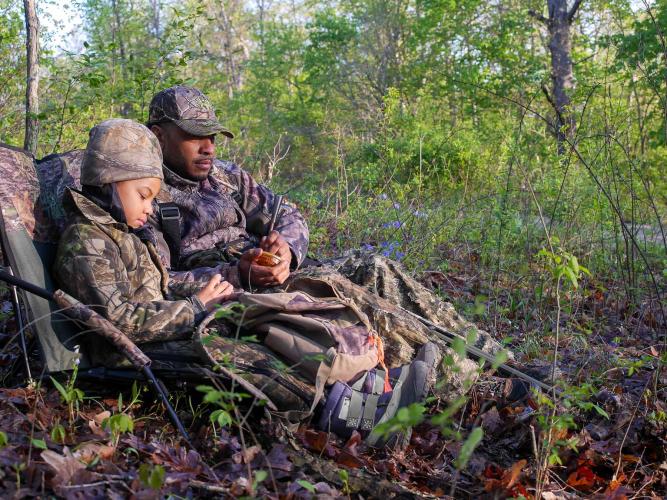
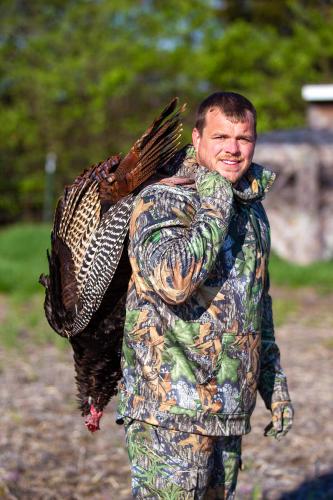

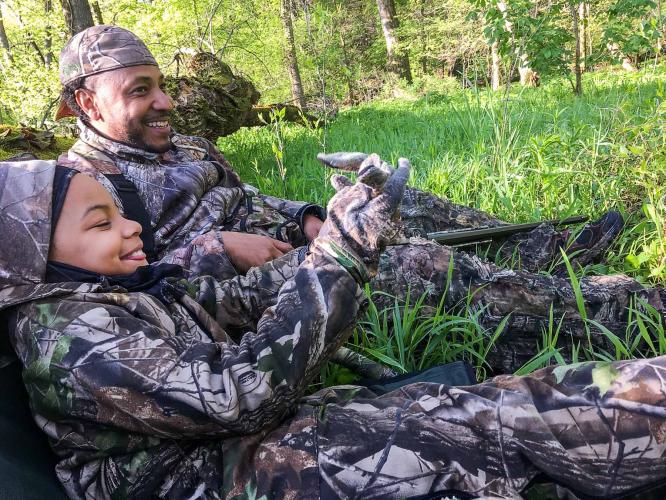
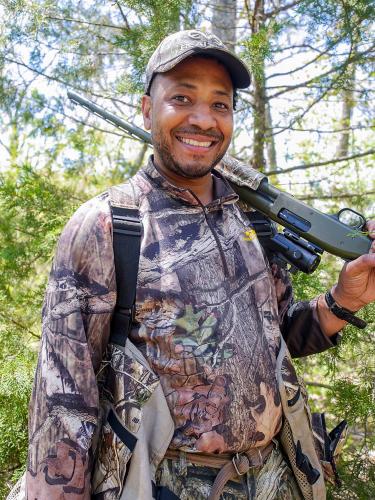
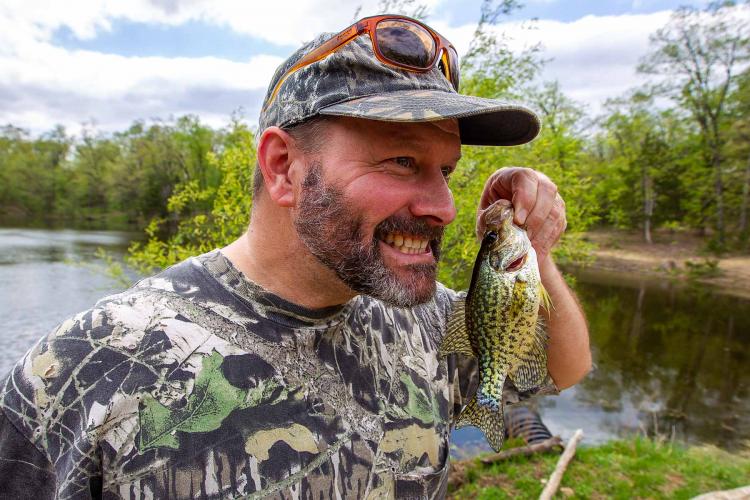
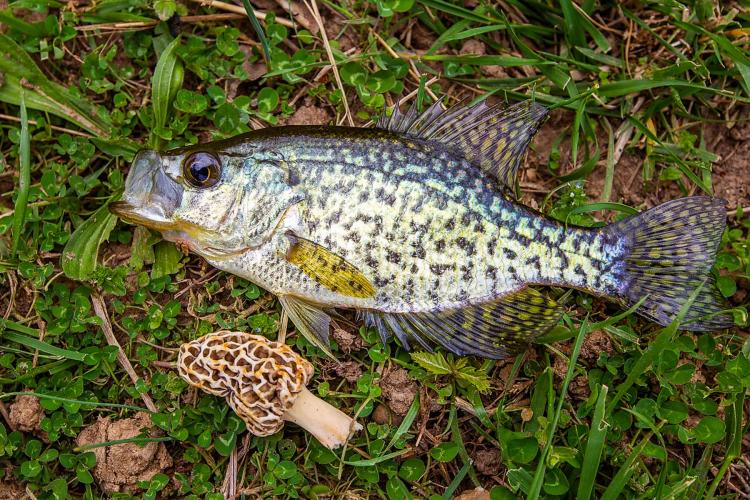
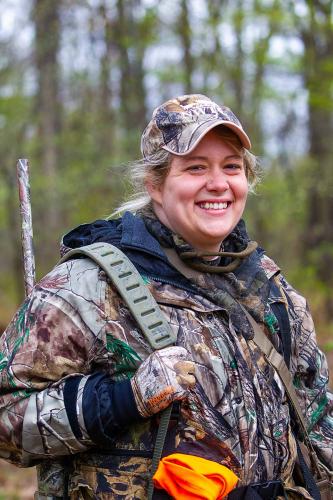
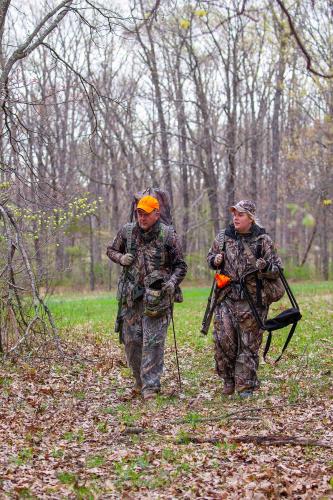
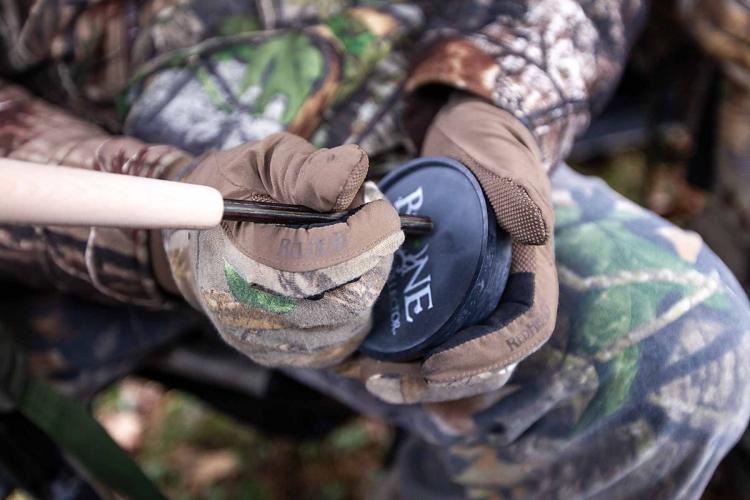


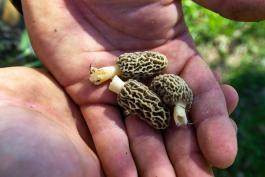
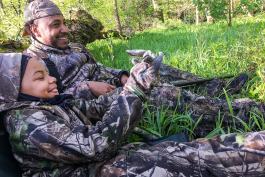





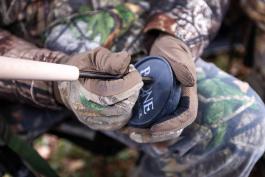
Also In This Issue

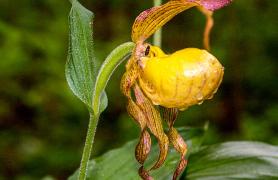
And More...
This Issue's Staff
Editor - Angie Daly Morfeld
Associate Editor - Larry Archer
Staff Writer - Bonnie Chasteen
Staff Writer - Heather Feeler
Staff Writer - Kristie Hilgedick
Staff Writer - Joe Jerek
Art Director - Cliff White
Designer - Shawn Carey
Designer - Les Fortenberry
Designer - Marci Porter
Photographer - Noppadol Paothong
Photographer - David Stonner
Circulation - Laura Scheuler






















